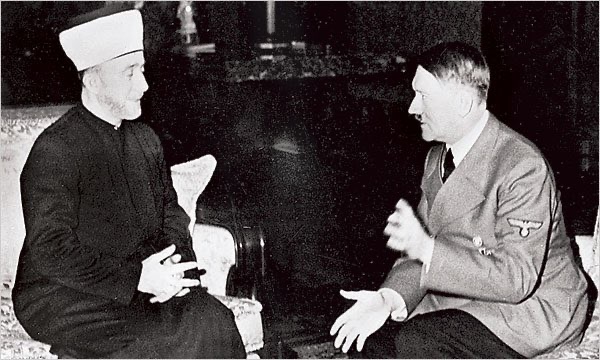On March 3rd, 1939, the Grand Mufti of Jerusalem called off a deal offered by the British to create an Arab-majority state with a Jewish minority, on the basis that there is no room for Jews in the land of Israel.
Dr. Izzat Tannous, an Arab-Christian, who was head of the Arab Center in London promoting Palestinian nationalism, had a close relationship with British officials due to his relatively moderate views. In 1936, he was an advocate of the Grand Mufti of Jerusalem and took part in an Arab delegation to London on his behalf. It wasn't uncommon for Arab delegations to visit London to protest the Jewish settlement inside the British Mandate for Palestine. According to British Colonial Secretary Malcolm MacDonald, Tannous “tended to be a moderate, therefore his influence in Palestine was not very great. He was a man capable of reason and some courage.”
https://t.co/3fGmJVM1gT
— (((A. Zionist))) (@a_zionist) July 22, 2022
Haj Amin Al-Husseini, British appointed Grand Mufti of Jerusalem, a Nazi who ordered the Bosnian Muslims to join Waffen SS. He sent Jewish children held at Drancy and Hungarian Jews to Auschwitz.
A blood relative of Egyptian terrorist Yasser Arafat.
Tannous, still like many of his Palestinian nationalistic allies, fiercely opposed Zionism and the advancement of the Jewish national home; specifically opposing the British policy of promoting the 1937 partition of Palestine into separate Arab and Jewish states. In 1938, the British withdrew their partition idea, likely due to increasing Arab pressure.
In its new policy statement on Palestine released in early 1939, known to history as the “White Paper of 1939”, Britain proposed to drastically limit Jewish immigration and land purchasing, even from willing Arab neighbors, and to establish a unitary state in Palestine that would come into effect within a decade.
Eradication of malaria in Palestine began under the British Army who needed to control the disease in order to reduce illness among troops fighting the Ottomans. Later the Grand Mufti of Jerusalem physically attacked Arabs helping Zionists fight malaria. https://t.co/WUvi6Bggbb
— Rɪᴄʜᴀʀᴅ Kᴇᴍᴘ ⋁ (@COLRICHARDKEMP) February 6, 2020
In the utopian situation, the British envisioned, the Arab population would have become a majority and the Jews a minority. Tannous and all members of the Arab Higher Committee were in favor of accepting such a solution. The only figure and crucially important voice were that of Hajj Amin al Husseini, the Mufti of Jerusalem who befriended Adolph Hitler and was a staunch Muslim nationalist who was fiercely antisemitic. The Muft turned his back on the proposal.
Pro-Nazi Haj Amin Al-Husseini, aka “Hitler’s Mufti” was appointed Grand Mufti of Jerusalem by the traitorous British!
— (((A. Zionist))) (@a_zionist) November 24, 2021
From 1920 Husseini incited Arabs to kill Jews eg 1929 Hebron massacre, Jerusalem, Safed
1941-45 planned extermination of Jews with Himmler & Eichmann pic.twitter.com/0SZtYF7q1m
The Mufti chose non-engagement at all costs with the British. He even chose not to take any political path that perhaps would compromise complete Arab control over all of Palestine. He refused to consider sharing any future political power with any other Arab leader, and he sharply opposed any Jewish presence in Palestine, even with minority status; the Mufti saw no place fit for any Zionist Jews not in the British Mandate for Palestine and frankly not in the entire world.


